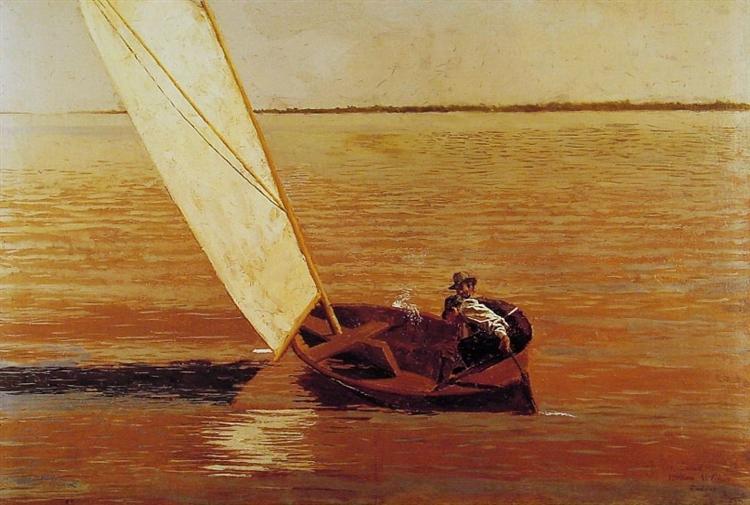Kuvaus
Thomas Eakins' painting "Navigation" (1875) is a masterful display of the artist's ability to combine realism with elements of everyday life, capturing a fleeting and meaningful moment in the nautical environment. In this work, Eakins depicts the experience of navigation on a river, a subject that reflects his fascination with human activity, the energy of movement, and the interrelationship of man with nature.
The composition of the work is carefully designed to guide the viewer’s gaze through an aquatic landscape that evokes a sense of freedom and adventure. The boat, which takes center stage in the work, is depicted at a crucial moment of navigation, with its sails unfurled, capturing the force of the wind. The technical details of the sails are precisely executed, reflecting Eakins’ interest in anatomy and mechanics, not only in the human figure, but also in the objects that surround the human being. The atmosphere of the scene is permeated with a visceral, almost tangible wind, inviting the viewer to feel the experience of sailing.
Colour plays a central role in the work, with a palette evoking the freshness and vivacity of summer. The interplay between the blue tones of the water and sky, contrasted with the creamy whites of the sails, creates a visual harmony that is complemented by the subtle nuances of light that Eakins has masterfully captured. This technique of using colour not only provides a sense of depth and space, but also sets a relaxed and contemplative mood, encouraging the viewer to appreciate the serenity of the moment.
In “Navigation,” the characters, though few in number, are depicted in a way that suggests an implicit narrative. We see a man at the helm, whose posture denotes both control and knowledge of the environment in which he finds himself. This character is not just a sailor; he represents the men of his time who ventured out to explore the world around them. Here, Eakins achieves not only a portrait of action, but also a portrait of humanity and its connection to the natural environment. Through his figures, Eakins conveys the idea of a journey that is both physical and introspective.
It is interesting to note that this work was produced at a time when Eakins was immersed in research into lighting and its effects on the human figure, which can be seen in the way the dim sun illuminates the painting's setting and highlights the details of the figures on the boat. The work is representative of Eakins' focus on direct observation of life and his rejection of the academic conventions that dominated the art of his time.
Although Sailing may not be as widely recognized as some of Eakins's more iconic works, it eloquently represents his distinctive style and commitment to authenticity. The painting can also be placed in dialogue with the artist's other works that explore the interaction between humans and their environment, such as The Great Race and The Runners, which also feature the movement and dynamism of the human body.
In conclusion, “Navigation” is not only a visual representation of Eakins’ art, but also a testament to his ability to capture the essence of the human experience in the natural setting. Through this work, Eakins establishes himself as a profound observer of human dynamics and their relationship to the world, establishing a legacy that has endured in the history of American art.
KUADROS ©, a famous painting on your wall.
Hand-made oil painting reproductions, with the quality of professional artists and the distinctive seal of KUADROS ©.
Painting reproduction service with satisfaction guarantee. If you are not completely satisfied with the replica of your painting, we will refund 100% of your money.

